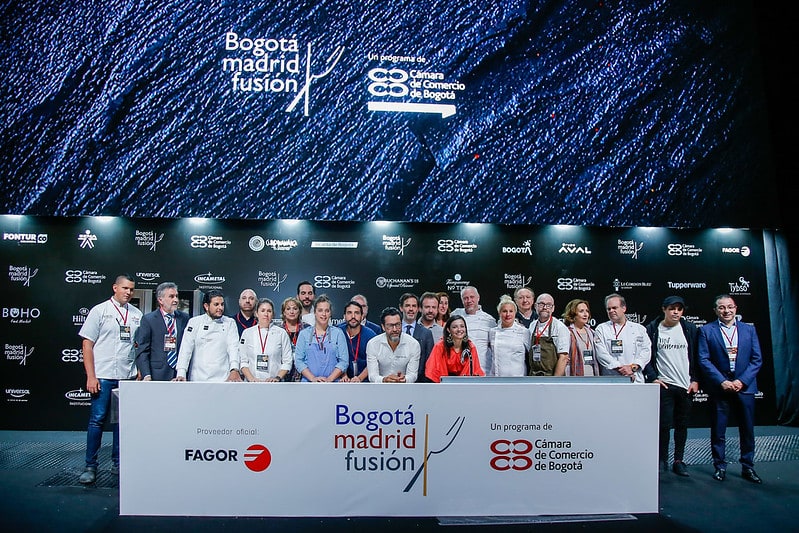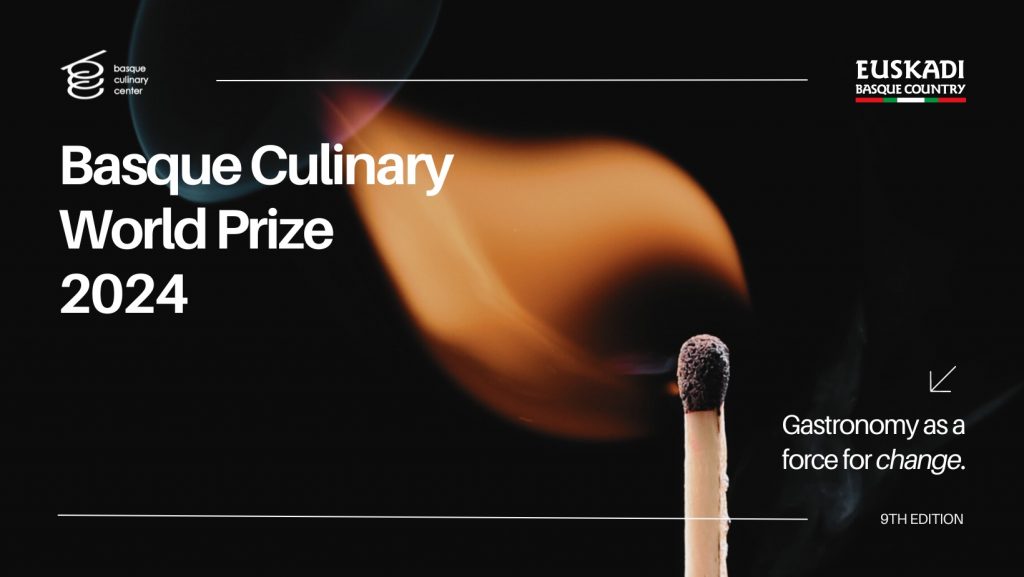
Bogotá Madrid Fusión, a new international edition of the Spanish gastronomic congress, concluded at the weekend after four days of intense activity, which saw 43 chefs from across the world gather in the Colombian capital for presentations, workshops and cooking demonstrations.
This first edition of Bogotá Madrid Fusión, attracted 11,400 visitors who came to learn and take part in one of more than 80 activities organised across the four days.
It represents a bold move to firmly put Colombia on the global culinary map. Mónica de Greiff, president of the Chamber of Commerce, the organisation that brought Madrid Fusión to Bogotá, said hosting the event shows commitment to gastronomy.
“This is going to put the Colombian gastronomy on a different level, it is very important for us,” she said. “We have signed up for five years because we know this is just the first stage. The diversity in Colombia in produce is enormous – we have a lot to give but we have not had the capacity to use it. I want Colombian cuisine to be recognised in Latin America as a cuisine of high quality where the produce is used in the best way possible.”
International flavours
Central to the programme was the presence of chefs from across the world, among them some of the biggest names in global gastronomy, including Joan Roca from El Celler de Can Roca in Spain, Slovenian chef Ana Ros of Hisa Franko, Enrique Olvera from Pujol in Mexico and Yoshihiro Narisawa who travelled in from Japan to share his experiences from his eponymous restaurant.
But Bogotá Madrid Fusión is first and foremost an opportunity to turn the spotlight on local gastronomy, which is thriving. Restaurants opened by chefs who champion produce from Colombia, which is the second most bio-diverse country in the world.
For much of the congress younger Colombian chefs, including Álvaro Clavijo, the chef owner of local dining hot spot El Chato and Miguel Warren, the 25-year-old chef of Medellin’s Barcal who was recognised with the award for best new chef, took centre stage as the future of Colombian gastronomy.
Gastronomy as an agent of change
Chef Harry Sasson, one of the most famous faces in Colombian gastronomy, opened the congress on day one.
In acknowledgement of Colombia’s complicated history and demonstrating how restaurants and chefs can make a real difference to people’s lives, he brought two farmers from the Putumayo region who supply his restaurant with palms of heart, locally known as palmito.
Edgar and Luis Monten egro explained how for many years their way of making a living was found through the growing of coca leaves. “We had no alternative but to grow coca leaves and sell it to those who made it into drugs. It was a way to survive,” said Edgar Montenegro. Violence and conflict with neighbours made them stop the production of coca leaves in the 90s. “We solved an economic problem but there were many other problems around it. After ten years we stopped and began producing palm hearts,” said Montenegro.
egro explained how for many years their way of making a living was found through the growing of coca leaves. “We had no alternative but to grow coca leaves and sell it to those who made it into drugs. It was a way to survive,” said Edgar Montenegro. Violence and conflict with neighbours made them stop the production of coca leaves in the 90s. “We solved an economic problem but there were many other problems around it. After ten years we stopped and began producing palm hearts,” said Montenegro.
With help from the state they were able to get started in the production of hearts of palm, a vegetable harvested from the inner core of palm trees, but selling their product and moving it within a challenging infrastructure proved another battle.
Sasson became an instrumental person in their business. After trying the little used product, Sasson embraced it as a delicious ingredient that few people knew about. Conscious of the important part he has played in the Putumayo farming community, Sasson said the story behind the palito is an important one for his restaurant. “As chefs we want to tell a story and when you have people coming in to your restaurant you want people to have an experience and of course this is an emotive story,” he explained. “Every decision we make as chefs has an impact on the world; whether this is on the produce we buy, who we buy from, or the people we employ,” said Sasson.
National pride
Another home grown chef, Leonor Espinosa who is the first Colombian to enter the World’s 50 Best Restaurants list with her restaurant Leo and famously a pioneer of ingredients from indigenous communities in the Amazon.
She gave over the stage to people from the Huitoto tribe who demonstrated use of the mambe, the roasted coca leaf reduced to a powder, in an eye-opening ceremony totally unfamiliar to those present.
 Later she explained her decision to take a step back. “I am not the main character in my cuisine. The main character is the land and the territory where the cuisine originates,” she said. “My gastronomy and what I do is already well-known, it is everywhere – we need a new narrative in gastronomy where the ego of the chef doesn’t come first.”
Later she explained her decision to take a step back. “I am not the main character in my cuisine. The main character is the land and the territory where the cuisine originates,” she said. “My gastronomy and what I do is already well-known, it is everywhere – we need a new narrative in gastronomy where the ego of the chef doesn’t come first.”
As one of the best known chefs in Colombia she has proudly acted as an ambassador of her country’s cuisine around the world. She pointed to a lack of national confidence stopping Colombia from reaching the same heights as countries such as Mexico and Peru on the world culinary map. “The only thing Colombia doesn’t have that countries like Peru and Mexico have is pride in what we do, this is a process,” she said.
The world watching
Among the international contingent Joan Roca, the head chef of Spain’s El Celler de Can Roca, twice recognised as the best in the world, said the arrival of Madrid Fusión in Bogotá is very significant. “First of all, it tells the world that hat here in Colombia there are important things happening. Some of us knew it already, the chefs in the world knew it already. We came here four years ago because we were fascinated by this wonderful country and because we wanted to learn,” he said.
“Perhaps the country needs to start believing in itself and this congress shows the people that there are stories to tell, there is produce, diversity and there is so much talent here. We now see local cooks who have travelled and who believe in their own gastronomic culture. I think this is just the beginning – Colombia will be a reference point in the world of gastronomy in years to come of that I am sure.”
Madrid Fusión originated in Madrid in 2001 and has long since become a focal point of world gastronomy as it convenes every year in the Spanish capital. In the years since it has hosted international editions in overseas locations including Manila and new York City.
Tina Nielsen




